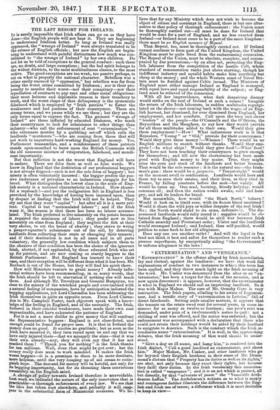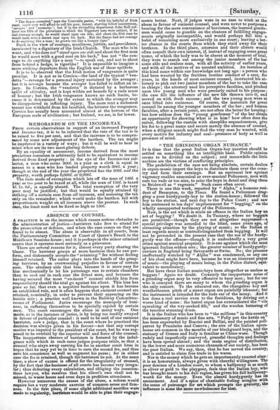"EXTERMINATION" AND " VENGEANCE."
" EXTERMINATION. " is the offence alleged by Irish incendiaries, lay and clerical, against the landlords : we have this week full explanations of conduct in two instances to which this term has been applied, and they throw much light on the Irish meaning of the word. Mr. Usaher was denounced from the altar as an "ex- terminator," has been a target for the aim of the assassin, and is now again denounced : it appears, however, that the exterminator is what in England we should call an improving landlord. So it was with Major Mahon. The case of Mr. Ormsby Gore is very instructive. The Irish papers, alluding to his estate of Leganom- mer, had a terrific story of " extermination in Leitrim," full of direct falsehoods. Setting aside smaller matters, it appears that the tenants on the estate owed rent for several years, in some in- stances for as many as twelve or fourteen; one year's rent was demanded, under pain of a .twelvemonth's notice to quit : not a shilling of rent was offered, and the notice was enforced ; but the enforcement was accompanied with a declaration that those who could not retain their holdings would be aided by their landlord to emigrate to America. Such is the conduct which the Irish in- cendiaries name " extermination." It is well, in the approaching debates, that the Irish meaning of that word should be under- stood.
" Give a dog an ill name, and hang him," is rendered into the Irish dialect, " Call a good landlord an exterminator, and shoot him." Major Mahon, Mr. Usaher,_ and other landlords who go far beyond their English brethren in their sense of Mr. Drum- mond's dictum that " Property has its duties as well as its rights," are shot, not only because they exact their rights, but because they fulfil their duties. In the Irish vocabulary this assassina- tion is called " vengeance"; and it is an act which is praised, all but directly, by that "advocate of peace" the "Venerable Arch- deacon Laffan." The Archdeacon's notions as to what is manly and courageous further illustrate the difference between the Eng,;- lish and Irish use of terms; a difference which it is most desirable to keep in view-
" The Saxon scoundrel; says the Venerable pastor, " with his bellyful of Irish meat, could very well afford to call his poor, honest, starving fellow countrymen, 'savages' and • assassins'; but if in the victualling department John Bull suf- fered one fifth of the privations to which the Tipperary men were subject, if he had courage enough, he would stand upon one side, and shoot the first man he would meet with a decent coat upon his back. But the Saxon had not courage to do anything like a man: he growls out like a hungry tiger."
Such is the view of courage, manliness, justice, and providence, inculcated by a dignitary of the Irish Church. The man who is in want, and who does not " stand upon one side and shoot the first man he would meet with a good coat on his back," has not "the cou- rage to do anything like a man "—to speak out, and not to shoot from behind a hedge, is tigerlike ! It is impossible to imagine a more striking departure from the English use of these epithets. It is to be observed that the Irish notion of vengeance is quite peculiar. It is not as in Corsica—the land of the typical " ven- detta "—revenge for a personal injury sustained by the avenger ; but it is revenge because the avenger has failed to inflict an in- jury. In Corsica, the "vendetta" is dictated by a barbarous spirit of chivalry, and is kept within set bounds by a rude sense of honour; but the Irish vengeance knows no such limits, be- cause it is determined by the extent to which the avenger may be disappointed in inflicting injury. The more rent a dishonest tenant has withheld from his landlord, the bitterer the vengeance. Corsica has usually been accounted almost at the bottom of the
uropean scale of civilization ; but Ireland, we see, is far lower.



























 Previous page
Previous page